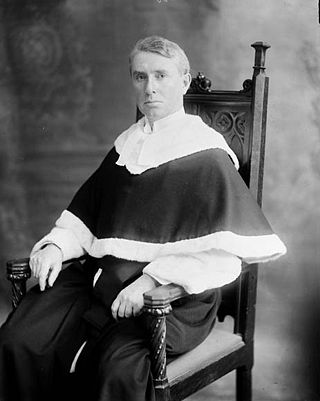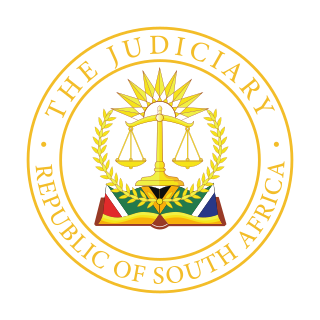The Judiciary of Abia State is a branch of the Abia State Government that interprets and applies the laws of Abia State. It acts as a mechanism for dispute resolution and also ensure equal justice under law. [1]
The Judiciary of Abia State is a branch of the Abia State Government that interprets and applies the laws of Abia State. It acts as a mechanism for dispute resolution and also ensure equal justice under law. [1]
The Judiciary consists of the High Court with 23 serving Judges, Customary Court of Appeal with 4 Judges, Magistrate's courts with 56 Magistrates and Customary courts all headed by Judges and Magistrates. The Chief Judge, appointed by the Governor sequel to approval by the House of Assembly is the head of the Judiciary.

Politics of Malawi takes place in a framework of a presidential representative democratic republic, whereby the President of Malawi is both head of state and head of government, and of a multi-party system. Executive power is exercised by the government. Legislative power is vested in both the government and the National Assembly. There is a cabinet of Malawi that is appointed by the President of Malawi. The judiciary is independent of the executive and the legislature.

The term magistrate is used in a variety of systems of governments and laws to refer to a civilian officer who administers the law. In ancient Rome, a magistratus was one of the highest ranking government officers, and possessed both judicial and executive powers. In other parts of the world, such as China, magistrate is a word applied to a person responsible for administration over a particular geographic area. Today, in some jurisdictions, a magistrate is a judicial officer who hears cases in a lower court, and typically deals with more minor or preliminary matters. In other jurisdictions, magistrates are typically trained volunteers appointed to deal with criminal and civil matters in their local areas.

The judiciary of South Africa is the body of judges and magistrates who sit in the courts of South Africa. The judiciary is an independent branch of the government, subject only to the Constitution of South Africa and the laws of the country. The Judiciary interprets the law of South Africa, using as the basis of its interpretation the laws enacted by the South African Parliament as well as explanatory statements made in the legislature during the enactment.

The judiciary of Portugal is a system of courts that together constitute one of the four organs of Sovereignty as defined by the Portuguese Constitution. The courts are independent from the other three Portuguese organs of Sovereignty.

The judiciary of India is the system of courts that interpret and apply the law in the Republic of India. The Constitution of India provides concept for a single and unified judiciary in India. India uses a mixed legal system based majorly on the common law system with civil laws applicable in certain territories in combination with certain religion specific personal laws.
The Judiciary of Sri Lanka are the civil and criminal courts responsible for the administration of justice in Sri Lanka. The Constitution of Sri Lanka defines courts as independent institutions within the traditional framework of checks and balances. They apply Sri Lankan Law which is an amalgam of English common law, Roman-Dutch civil law and Customary Law; and are established under the Judicature Act No 02 of 1978 of the Parliament of Sri Lanka.

The Judiciary of Malawi is the branch of the Government of Malawi which interprets and applies the laws of Malawi to ensure equal justice under law and to provide a mechanism for dispute resolution. The legal system of Malawi is based on English law, modified since 1969. The Constitution defines the judiciary as a hierarchical system of courts, with the highest court being a Supreme Court of Appeal, together with a High Court and a number of magistrates' courts. Malawian judiciary has frequently demonstrated its independence in recent years. The Constitutional Court of Malawi nullified the 2019 election results, citing widespread irregularities. The Supreme Court upheld the verdict of the Constitutional Court. Five Constitutional Court judges who overturned the results of the 2019 election have been nominated by the UK thinktank Chatham House for the 2020 Chatham House Prize. Ultimately the judges went onto win the prize.
The Judiciary of Rivers State is a branch of the Government of Rivers State that has sole authority and responsibility for the interpretation and application of the state's laws as well as the adjudication of disputes or controversies.

The Judiciary of Tanzania is the system of courts that interprets and applies the law in Tanzania. The current judiciary bases its foundation to the constitution of the United Republic of Tanzania of 1977. Under the Constitution of Tanzania, Justices and Magistrates are independent of the government and subject only to the Constitution and the law. The country has a dual juristition system where there is a judicial structure responsible for Tanzania Mainland and another for Zanzibar. The Court of Appeal of the United Republic was established in 1979 as the final appellate judicial body with jurisdiction over the entire union.
The Lagos State Judiciary is one of the three co-equal branches of the Lagos State Government organized under the Constitution of Nigeria and laws of Lagos State. The Chief Judges are appointed by the State Governor with the consent of the House of Assembly.
Lagos State Government is the government of Lagos State, concerned with the administration of the state ministries. The government consists of the executive, legislative and Judiciary. The government is headed by the Governor who is the policy-maker and often assisted by the commissioners and other civil servants of the state.
The government of Abia State is the supreme governing authority of Abia State and its local governments. It consists of the executive headed by the governor, the legislative and the judiciary.
The Chief Judge of Abia State is the title or office appointed to the head of the judiciary of the Abia State Government. The Chief Judge is appointed by the Governor of Abia State to preside over the state's High Court and also to oversee and supervise its unified court system. The incumbent Chief Judge is Justice Lilian Abai, who was appointed into the position by Alex Otti in May 2023.
The Abia State High Court of Justice is the highest and central court of Abia State located in Umuahia, the state's capital city. It has supreme authority than the Magistrate's courts and Customary courts in handling and determining major cases. It is headed by a Chief Judge who is appointed by the Governor on recommendation from the National Judicial Council and subject to confirmation by the Abia State House of Assembly.

The Judiciary of Kiribati is the branch of the Government of Kiribati which interprets and applies the laws of the country. In addition to the Constitution of Kiribati and the corpus of laws, the laws of Kiribati include customary law, which the courts must take into account when considering specified matters in criminal and civil proceedings.

The Judiciary of Burundi is the branch of the Government of the Republic of Burundi which interprets and applies the laws of Burundi to ensure impartial justice under law and to provide a mechanism for dispute resolution. The independence of the judiciary is guaranteed by the constitution.

The Judiciary of Sierra Leone is the branch of the Government of the Republic of Sierra Leone which interprets and applies the laws of Sierra Leone to ensure impartial justice under law and to provide a mechanism for dispute resolution. The independence of the judiciary is guaranteed by the constitution.
Akwa Ibom State Government is the government of Akwa Ibom, concerned with the administration of the state ministries. The government consists of Executive, Legislative and Judiciary. The government is headed by Udom Gabriel Emmanuel who is the policy-maker and often assisted by the commissioners and other civil servants of the state.
The Kaduna State Judiciary is the third arm of government in the state government, while the other two being the Executive and the Legislature. It is organized under the Nigerian constitution and laws of the Kaduna State. The state judiciary is responsible for the administration of Justice in the state, it adjudicates in disputes between the state government and any other persons within its jurisdiction. The Chief Judge is appointed by the Kaduna State Governor with the consent of the House of Assembly to serve until the end of their tenure, resigned, impeached and convicted, retire, or die.
Kano State Government is the government of Kano State, concerned with the administration of the state ministries. The government consists of the executive, legislative and Judiciary. The government is headed by the Governor who is the policy-maker and often assisted by the Commissioners and other civil servants of the state.